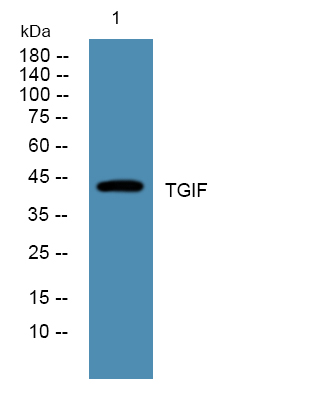TGIF Polyclonal Antibody
- Catalog No.:YT4635
- Applications:WB;ELISA
- Reactivity:Human;Mouse;Rat
- Target:
- TGIF
- Fields:
- >>TGF-beta signaling pathway
- Gene Name:
- TGIF1
- Protein Name:
- Homeobox protein TGIF1
- Human Gene Id:
- 7050
- Human Swiss Prot No:
- Q15583
- Mouse Gene Id:
- 21815
- Mouse Swiss Prot No:
- P70284
- Immunogen:
- Synthesized peptide derived from the C-terminal region of human TGIF.
- Specificity:
- TGIF Polyclonal Antibody detects endogenous levels of TGIF protein.
- Formulation:
- Liquid in PBS containing 50% glycerol, 0.5% BSA and 0.02% sodium azide.
- Source:
- Polyclonal, Rabbit,IgG
- Dilution:
- WB 1:500 - 1:2000. ELISA: 1:10000. Not yet tested in other applications.
- Purification:
- The antibody was affinity-purified from rabbit antiserum by affinity-chromatography using epitope-specific immunogen.
- Concentration:
- 1 mg/ml
- Storage Stability:
- -15°C to -25°C/1 year(Do not lower than -25°C)
- Other Name:
- TGIF1;TGIF;Homeobox protein TGIF1;5'-TG-3'-interacting factor 1
- Observed Band(KD):
- 43kD
- Background:
- The protein encoded by this gene is a member of the three-amino acid loop extension (TALE) superclass of atypical homeodomains. TALE homeobox proteins are highly conserved transcription regulators. This particular homeodomain binds to a previously characterized retinoid X receptor responsive element from the cellular retinol-binding protein II promoter. In addition to its role in inhibiting 9-cis-retinoic acid-dependent RXR alpha transcription activation of the retinoic acid responsive element, the protein is an active transcriptional co-repressor of SMAD2 and may participate in the transmission of nuclear signals during development and in the adult. Mutations in this gene are associated with holoprosencephaly type 4, which is a structural anomaly of the brain. Alternative splicing has been observed at this locus and multiple splice variants encoding distinct isoforms are described. [provide
- Function:
- disease:Defects in TGIF1 are the cause of holoprosencephaly type 4 (HPE4) [MIM:142946]. Holoprosencephaly (HPE) [MIM:236100] is the most common structural anomaly of the brain, in which the developing forebrain fails to correctly separate into right and left hemispheres. Holoprosencephaly is genetically heterogeneous and associated with several distinct facies and phenotypic variability.,function:Binds to a retinoid X receptor (RXR) responsive element from the cellular retinol-binding protein II promoter (CRBPII-RXRE). Inhibits the 9-cis-retinoic acid-dependent RXR alpha transcription activation of the retinoic acid responsive element. Active transcriptional corepressor of SMAD2. Links the nodal signaling pathway to the bifurcation of the forebrain and the establishment of ventral midline structures. May participate in the transmission of nuclear signals during development and in the adu
- Subcellular Location:
- Nucleus.
- Expression:
- Brain,Liver,Placenta,
- June 19-2018
- WESTERN IMMUNOBLOTTING PROTOCOL
- June 19-2018
- IMMUNOHISTOCHEMISTRY-PARAFFIN PROTOCOL
- June 19-2018
- IMMUNOFLUORESCENCE PROTOCOL
- September 08-2020
- FLOW-CYTOMEYRT-PROTOCOL
- May 20-2022
- Cell-Based ELISA│解您多样本WB检测之困扰
- July 13-2018
- CELL-BASED-ELISA-PROTOCOL-FOR-ACETYL-PROTEIN
- July 13-2018
- CELL-BASED-ELISA-PROTOCOL-FOR-PHOSPHO-PROTEIN
- July 13-2018
- Antibody-FAQs
- Products Images

- Western blot analysis of lysates from KB cells, primary antibody was diluted at 1:1000, 4°over night



